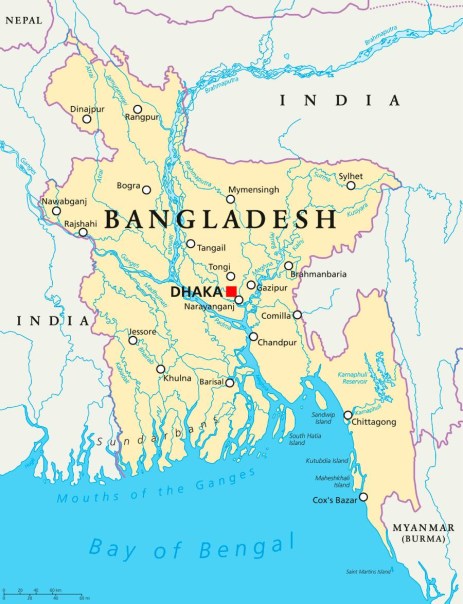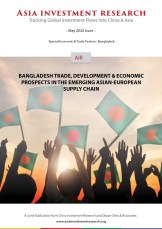Diversifying Europe-Asia Supply Chains: The Bangladesh Option
Bangladesh has preferential EU & UK trade rights until 2031 and could be a China alternative.
By Asia Investment Research
Bangladesh has a competitive investment climate, relatively large and young labor market, and is ambitious to grow its agribusiness, garment and textiles, energy, IT, and infrastructure sectors. Dhaka wants to attract foreign companies seeking to relocate from China or countries wanting to diversify their investment footprint in Asia. Bangladesh offers a low-cost and skilled labor market and imposes few limits on the level of foreign equity participation allowed.
The country’s consumer economy also offers rising prospects, with Bangladesh’s GDP per capital income now higher than India’s, after registering a 9% growth over the past year.
Bangladesh Investment Profile
The government of Bangladesh is keen to attract greater foreign direct investment (FDI) to build up capacity in its export-oriented industries and burgeoning technology and services sector. The country’s political leaders have asserted a development-first strategy, and FDI plays a prominent role in advancing their goals in this regard. For years, its ‘least developed country’ (LDC) status allowed Bangladesh to tap into the Generalized System of Preferences (GSP) for benefits on exports as well as access concessions in various trade treaties. However, the country is now on its way to graduate from this group and is expected to be taken off the United Nations’ list of LDCs by 2026 due to progress made on three fronts: per capita income, human assets, economic and environmental vulnerability. Bangladesh will, however, enjoy preferential market access to the EU and UK for an extra three years, till 2031. So far, Dhaka has responded to this eventuality by aggressively expanding and modernizing its infrastructure, setting up investment-friendly zones, targeting key countries for greater FDI, and liberalizing relevant policies.
Moreover, Bangladesh’s export industries are dominated by the readymade garment (RMG) industry – an outsize contribution that the government hopes will reduce as other industries grow in output and value. This is also critical for the country’s financial stability as export income will fall after the withdrawal of LDC linked benefits in international trade. Overall, the Bangladesh economy grew at around 5.2 percent in the fiscal year ending June last year and is projected to grow 7.4 percent in 2022. Despite the blip in growth – when compared with previous forecasts – Bangladesh is still doing much better than its regional peers.

Bangladesh currently allows foreigners to privately invest in all its industries, except the defense, nuclear energy, mining, and forest plantation industries. Foreign investment is especially sought in export-oriented industries, industries in export processing zones (EPZs), and high-tech products as import substitutes or meant for export. However, in areas where FDI policy is liberal on paper, there may still be hidden barriers for investors if the government seeks to promote local capacity creation or privilege domestic players. In this scenario, foreign investors may have to modify their market entry strategy. Nonetheless, Bangladesh should be a serious contender for new supply chain considerations given the current pandemic problems still apparent in China, and disruptions created by the Ukraine conflict.
Summary
Market research can be undertaken to evaluate the Bangladesh alternative both in terms of local suppliers and deliverables sustainability in addition to the export manufacturing options. The country has a plethora of Processing and Export Trade Zones offering tax incentives for foreign manufacturers wishing to develop and export Bangladesh components. Given the countries proximity to ASEAN and the SAARC free trade nations, including India, the country should be considered as a potential supply chain sourcing and processing hub for foreign investors in Asia looking to diversify risk.
 Dezan Shira & Associates has a presence in Bangladesh and can assist with local evaluations. Please contact us at bangladesh@dezshira.com for assistance.
Dezan Shira & Associates has a presence in Bangladesh and can assist with local evaluations. Please contact us at bangladesh@dezshira.com for assistance.
This article was taken from the current Asia Investment Research paper, “Bangladesh Trade, Development & Economic Prospects In The Emerging Asian-European Supply Chain”. This 56 page document can be downloaded on a pay-what-you-want basis (minimum US$10) from the Asia Investment Research library here.
Related Reading
About Us
Asia Investment Research is owned by Dezan Shira & Associates and provides in-depth, original financial research into Asia. The firm assists foreign investors into Asia and has 28 offices across the region including India, China, ASEAN, and Bangladesh. For assistance in Bangladesh, please email us at bangladesh@dezshira.com or visit us at www.dezshira.com





